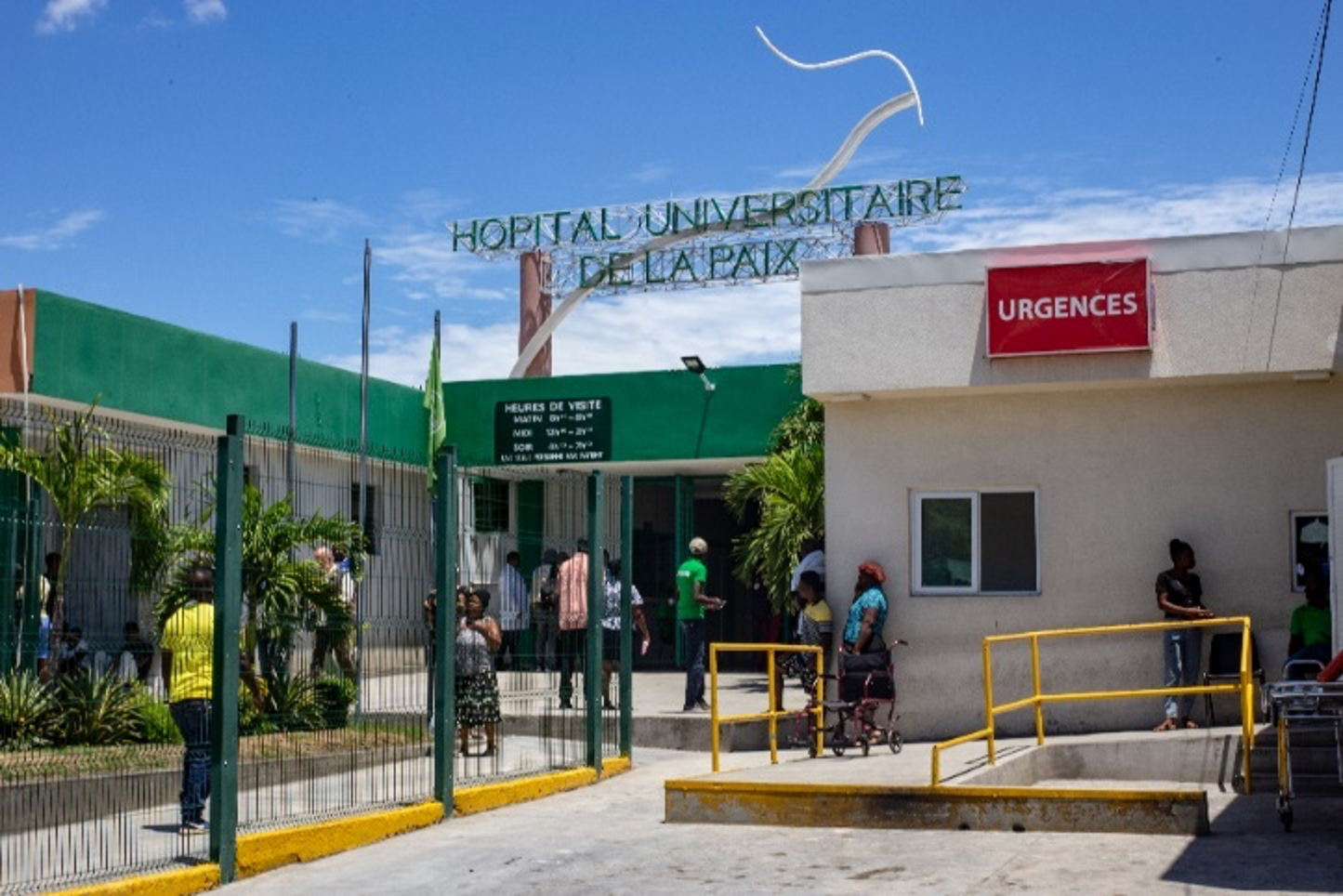/data-and-analytics-(dna)/data-exchange-(dex)/who-presence-in-countries--territories-and-areas.tmb-1920v.jpg?sfvrsn=f1146a2_2)
Sustaining essential health services and emergency care amid Haiti’s security crisis
Stronger WHO country presence for a healthier and safer world
Joint Outcome 6.2.
Access to essential health services during emergencies is sustained and equitable
In early 2024, escalating violence and conflict in Haiti severely disrupted health care access, leaving millions without essential health services. With 38% of health facilities closed, including major hospitals in Port-au-Prince, Hôpital Universitaire la Paix (HUP) emerged as a critical lifeline, providing free emergency care, maternal health services and essential health services at significantly reduced costs.
Through the targeted support of the Pan American Health Organization/World Health Organization (PAHO/WHO), HUP maintained full operations by activating a mass casualty plan, improving health care workforce capacity, and ensuring a steady supply of essential medical equipment and materials. This support has been vital in sustaining access to essential health services and life-saving emergency care during one of Haiti’s most severe health crises in recent history.
Throughout 2024, PAHO/WHO supported HUP at the forefront of the Ministry of Public Health and Population’s response to Haiti’s ongoing emergency. With the closure of main hospitals across the metropolitan area of Port-au-Prince, HUP became the only public health facility capable of managing a high influx of critically injured patients while maintaining advanced emergency management capabilities. Approximately 300 000 adults can access HUP within 30 minutes, and over 1 million within an hour, underscoring its critical role in health care service delivery.

At the onset of the security crisis in March 2024, PAHO/WHO supported the activation of HUP’s contingency plan to enhance its capacity to manage the influx of critically injured patients and provide them with prompt, life-saving care. The cornerstone of this response, and part of PAHO/WHO’s Smart Hospitals initiative, was the newly built ambulatory emergency room, opened in May 2023. This has significantly improved patient management, enabling efficient triage, stabilization and treatment.
To sustain operations amid constant supply chain disruptions, including the closure of Port-au-Prince’s international airport, maritime port restrictions and border closures with the Dominican Republic, PAHO/WHO leveraged its logistic capabilities to deliver essential medicines and medical supplies. This effort enabled HUP to sustain essential health services and free emergency care throughout the year, despite severe operational constraints. Additionally, PAHO/WHO facilitated the delivery of nearly 35 000 gallons of fuel, ensuring uninterrupted power for both HUP and the national ambulance service.
Capacity-building initiatives further strengthened HUP’s emergency response capabilities. PAHO/WHO supported specialized training for medical personnel in pain management, humanization of care and care management in the emergency room. These efforts have enhanced the quality of emergency care and improved patient outcomes.
As a direct result of these interventions, HUP provided free emergency care to more than 21 000 individuals between May and December 2024, with 61.2% of cases classified as medical emergencies and 38.8% as trauma-related. Additionally, 967 caesarean sections were performed at a 50% cost reduction, ensuring continued access to essential maternal health services. Despite these achievements, significant challenges persist.
Overcrowded inpatient services leave emergency patients requiring hospitalization to remain in the emergency room, further straining capacity and limiting the intake of new critical cases. Additionally, the difficulties in accessing primary care for chronic disease management has led to an increase in outpatient consultations, further burdening HUP’s capacity.
Moving forward, PAHO/WHO aims to expand its technical cooperation with HUP and strengthen primary care facilities, to reduce the burden on HUP and enhance health care access across the country.
PAHO/WHO’s successful partnership with HUP has been instrumental in ensuring uninterrupted essential health services and life-saving emergency care during Haiti’s ongoing crisis. The hospital’s strengthened capacity has attracted additional stakeholders, reinforcing national public health priorities and contributing to a more resilient and sustainable health care system. By joining forces, PAHO/WHO and its partners and stakeholders are not only improving access to essential health services, but laying the foundation for a more sustainable and adaptive health care infrastructure in Haiti.
